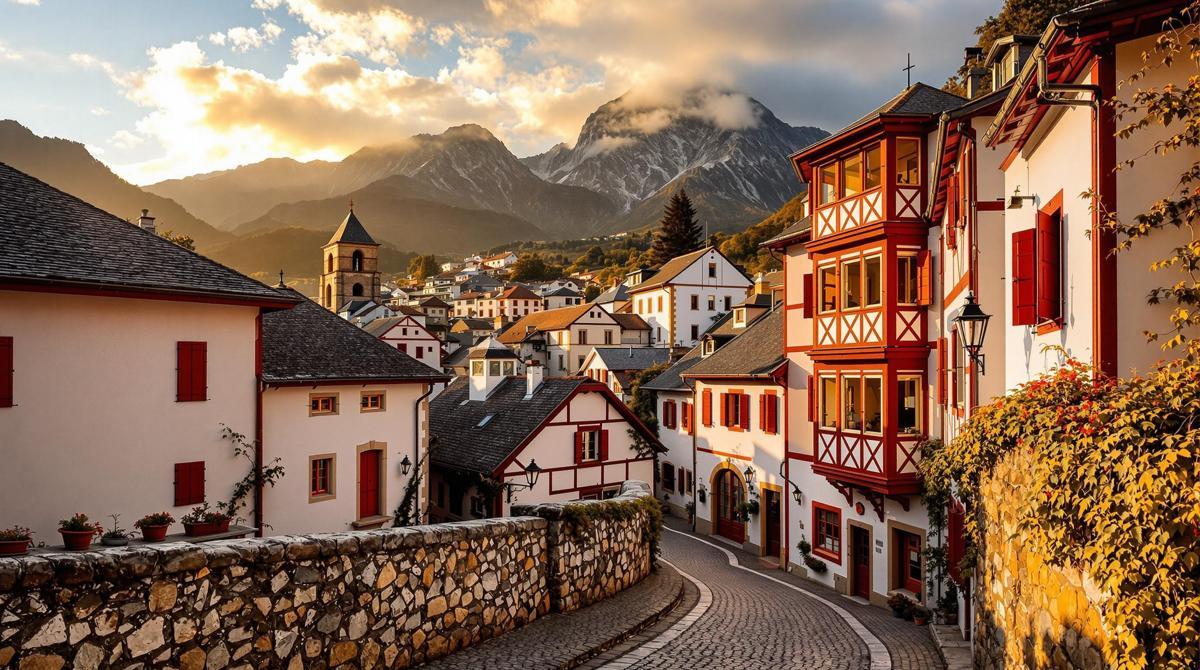Sare: The Secret Basque Gem Where Time Stands Still in the French Pyrenees
A village where red and white houses tell ancient stories
Tucked away in France’s Pyrénées-Atlantiques department, Sare reveals itself as a perfect postcard of Basque culture frozen in time. Its distinctive white houses with oxblood-red trim stand proudly against the dramatic backdrop of La Rhune mountain, creating a scene that has hardly changed in centuries.
“Our village breathes with the rhythm of ancient traditions,” explains Marie Etcheverry, a local artisan whose family has lived in Sare for seven generations. “The colors of our houses aren’t just decorative—they represent our Basque identity that has survived despite centuries of challenges.”
Where smugglers once roamed and legends were born
Sare holds a fascinating history as a smugglers’ hideout, with its strategic position near the Spanish border making it perfect for clandestine border crossings. These narrow, winding streets once hosted midnight exchanges of contraband goods, adding a layer of intrigue to this peaceful village.
The village’s eleven distinct quarters, extending from the central plaza, each tell their own stories of this colorful past. Wandering through these neighborhoods feels like stepping through pages of unwritten history books.
Underground wonders that reveal prehistoric secrets
The Grottes de Sare (Caves of Sare) stand as one of the region’s most captivating natural attractions. These limestone caverns offer a journey into both geological wonder and Basque mythology, where ancient spirits still seem to linger in the shadows.
The caves, featuring chambers adorned with stalactites and stalagmites, were once used for prehistoric rituals. Today, they provide visitors with multimedia presentations about Basque legends and early human activities in the region.
A church that witnessed centuries of Basque devotion
Saint-Martin Church, with its three-tiered wooden galleries, epitomizes the unique architectural style found only in traditional Basque churches. These galleries, where men and women once sat separately during services, represent one of the best-preserved examples of traditional Labourdin religious architecture in the region.
Where food tells the story of a resilient culture
Sare’s cuisine captures the essence of Basque culinary traditions. Local restaurants serve txuleta (aged beef steaks), piperade (pepper stew), and gâteau basque (a custard-filled pastry that has its own dedicated museum in the village). These dishes have survived centuries virtually unchanged.
“Our food isn’t just sustenance—it’s our history on a plate,” says Jean Iribarne, a local chef whose restaurant uses recipes passed down through generations. “Every bite connects you to hundreds of years of Basque tradition.”
The crimson train that climbs through the clouds
The century-old wooden cog railway that ascends La Rhune mountain offers panoramic views that stretch from the Pyrenees to the Atlantic Ocean on clear days. This vintage train experience feels like stepping back in time while ascending nearly 3,000 feet above sea level.
Where wild ponies roam free on misty mountaintops
The indigenous pottok ponies that have inhabited these mountains since prehistoric times create magical encounters for hikers exploring the peaks around Sare. These small, hardy creatures with shaggy winter coats represent one of Europe’s oldest horse breeds and remain semi-wild in their mountain habitat.
A perfect base for digital nomads seeking authenticity
With its proximity to both mountains and sea, Sare offers an ideal setting for remote workers looking to escape tourist crowds while maintaining access to essential amenities. The village provides reliable internet connections alongside authentic cultural immersion—a combination increasingly sought after by location-independent professionals.
The pelota courts where ancient sports come alive
Sare’s fronton (pelota court) remains the beating heart of village social life, where locals gather to play and watch traditional Basque sports that combine elements of handball, racquetball, and jai alai. These games, dating back centuries, showcase the remarkable athletic prowess valued in Basque culture.
Where sacred traditions remain untouched by time
Like sacred spaces in other cultures, Sare’s annual festivals preserve rituals that have remained largely unchanged for centuries. The village’s summer celebrations feature traditional Basque music played on txistu flutes and tamborins, alongside displays of strength in stone-lifting competitions and precision in wood-chopping contests.
Sare exists as a living museum where Basque culture thrives authentically rather than as a performance for tourists. Visitors who venture beyond the beaten path to this mountain village find themselves transported to a place where traditions aren’t preserved behind glass but lived daily by people who understand their value in an increasingly homogenized world.
